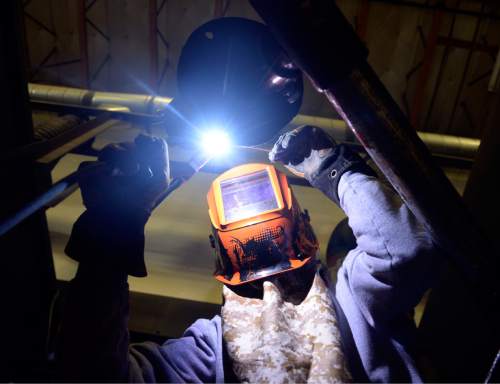This is an archived article that was published on sltrib.com in 2016, and information in the article may be outdated. It is provided only for personal research purposes and may not be reprinted.
A report suggesting Utah is lagging further behind its education goal than previously thought continues to hit a nerve at the Utah Capitol.
Hair stylists and factory workers returning for additional job training have been considered post-secondary Utah graduates in recent years — a shock to several lawmakers when the Utah College of Applied Technology's "diluted" reporting was uncovered in a November legislative audit.
Some members of a higher education budget committee Tuesday characterized UCAT — the Legislature's own brainchild — as wayward and unrepentant.
It's a turnaround from 2001, when lawmakers and the governor celebrated the passage of a new law establishing the network of statewide campuses that caters to the needs of local employers.
Sen. Howard Stephenson accused the school of "fraudulent reporting" that represented typical behavior from UCAT officers in recent years.
"There's no mea culpa, there's no admission of wrongdoing, there's no recognition of making mistakes in judgment," said the Draper Republican.
UCAT President Rob Brems and UCAT Board Chairman Tom Bingham countered that rapidly changing technology has driven industry demand for shorter certificates in Utah and across the country. Although brief, the workshops are meaningful, the pair said.
"You continue to completely miss the point," said Higher Education Appropriations Committee Chair Stephen Urquhart.
The St. George Republican and a half dozen of his colleagues on the committee said UCAT's offense was duping them by failing to make clear distinctions between two-year degrees such as nursing and other degrees lasting three months or less.
Tell the Tribune: Have you attended UCAT?
"These short-term programs are fine. If this is what industry is demanding, that's great. That's not part of the conversation. The conversation is about honesty and the integrity you bring to this committee," Urquhart told the UCAT officers.
The school is responsible for about 10 percent of the sweeping state education goal often touted by Gov. Gary Herbert, who wants two-thirds of Utahns to have some kind of post-high school degree by 2020. UCAT's most recent annual report suggests it was a hair behind the state's 2015 benchmark. But the audit found UCAT's reported graduation rates were inflated by 43 percent.
"I do feel badly" that the school reported its overall graduation rate to legislators, UCAT President Rob Brems said after the meeting. That broad count did include students who left early to take jobs and others participating in 60-hour trainings, but UCAT's yearly report also dissected the data into detailed breakdowns, he said.
Brems heard the panel's message, he added, "loud and clear."
"We're very proud of what goes on across the system" of more than 30,000 students, Brems said, "and we hope that we can get these problems ironed out so that we can focus on that going forward."
The panel didn't take any action Tuesday, but is set to discuss potential UCAT reforms in coming weeks. The network of colleges is expected to receive a baseline budget of about $12 million in state funds this year.
Twitter: @anniebknox



